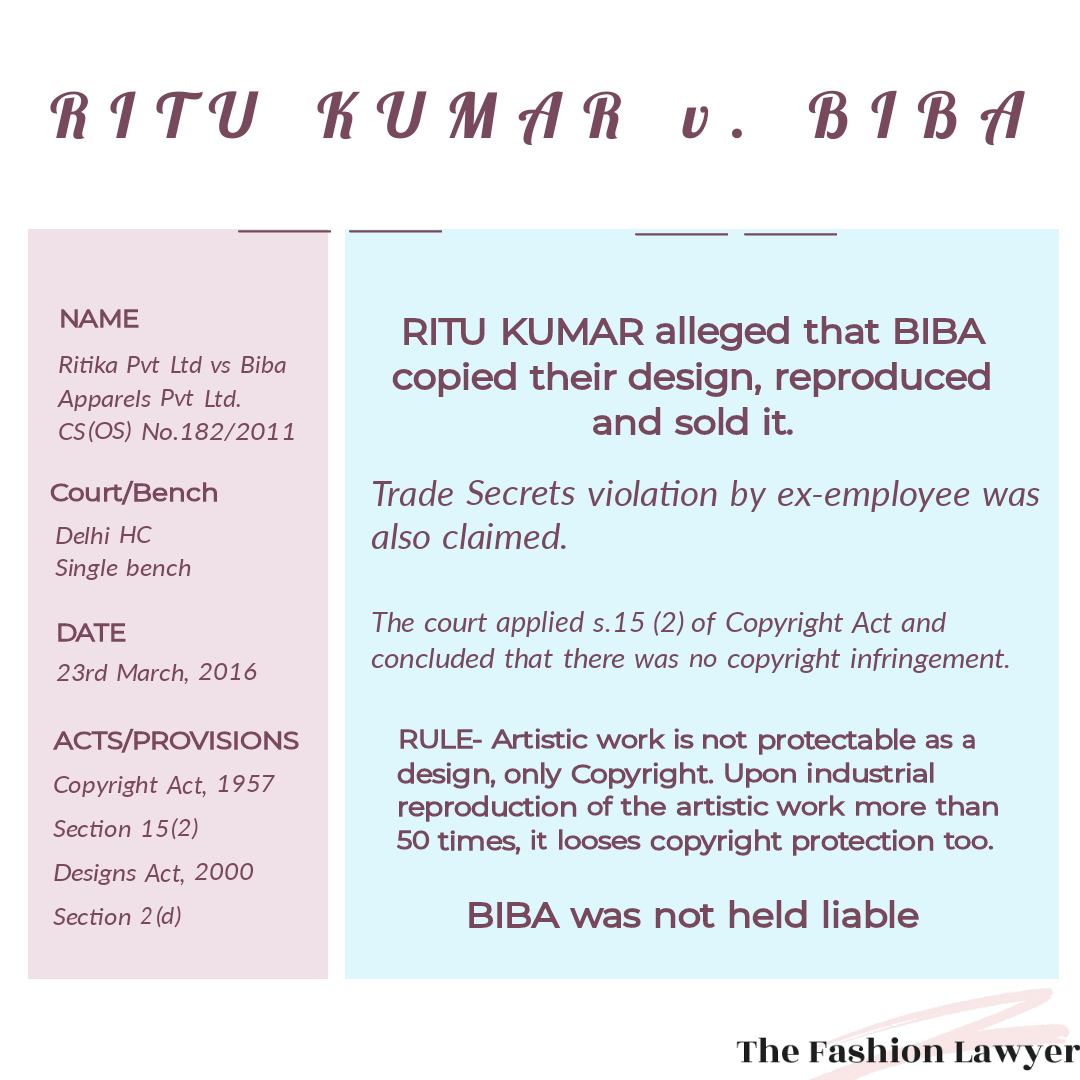Ritika Pvt. Ltd. (RITU KUMAR) Vs. Biba Apparels Pvt. Ltd: Summary and Analysis
This case is interesting and important as it involved two major ethnic wear brands who are well known in Indian Households- RITU Kumar and BIBA. Secondly, it further clears up Court's stand on the ambiguity surrounding the “design” and “artistic works” in designs.
Important Facts:
1) RITU KUMAR (Plaintiff) filed the copyright suit claiming infringement by BIBA.
2) Plaintiff also claimed Trade Secrets violation by ex-employee.
3) Plaintiff’s designs were not registered under the Designs Act, 2000.
Relief sought:
RITU KUMAR sought an injunction from Court restraining BIBA from reproducing, printing, publishing, selling or offering etc., prints or garments which are a colourable imitation or substantial reproduction of the plaintiff’s prints and garments.
Relevant Provisions
Section 2(d), Designs Act, 2000
Definition of a ‘design’ excludes "any artistic work as defined in clause (c) of section 2 of the Copyright Act, 1957."
Section 15, Copyright Act, 1957: Special provision regarding copyright in designs registered or capable of being registered under Designs Act
(1) Copyright shall not subsist under this Act in any design which is registered or capable of being registered under the Designs Act.
(2) Copyright in any design, which is capable of being registered under the Designs Act, 2000 (16 of 2000), but which has not been so registered, shall cease as soon as any article to which the design has been applied has been reproduced more than fifty times by an industrial process by the owner of the copyright, or, with his licence, by any other person.“
Decision:
The Court held that BIBA Apparels is not liable for infringement of copyright.
Why Design protection is not available?
The design in question was not registered under the Designs Act, 2000. Hence, no protection was available under the Act.
Why copyright protection is not available?
By the virtue of Section 15(2) of the Copyright Act, copyright protection was not available. Ritu Kumar by reproducing the said designs on its apparels, more than 50 times, was disentitled to enforce its copyright in the original drawing of the design.
Court further said that the Defendant (BIBA) was creating apparel by an industrial process and was not merely lifting and affixing a print taken from the copyrighted work of the Plaintiff.
Why charges of Trade Secrets violation were dismissed?
The Court said that issue of violation of trade secrets is not specifically pleaded. The charges are very general. For an injunction order, specific trade secrets and details of ownership of such trade secrets have to be mentioned.
Conclusion and Analysis:
A plain reading of the provisions and the case contextualized in the fashion industry, gives an impression that a design which is applied/made into apparel more than 50 times looses all protection.
The obvious conclusion follows that designers must register each and every of their designs under Designs Act, 2000 to protect their designs. Alternatively, designers can produce less than 50 copies of a design only to avail copyright protection.
But in practical world, it is not possible to produce less than 50 pieces of one design as there is an increased demand of latest designs among consumers. When this provision was introduced, it is possible that producing 50 articles was a benchmark, but situation is much different now. With the modern day technologies, a designer can produce more than 50 pieces in a day and maximize the profit.
Also, the task is tedious to register every single design. The copyright law fails to protect the designs. The Indian Copyright laws fail to provide adequate protection to the designers and require an update considering the Industry requirements.
Read full judgment here.


Comments
Post a Comment